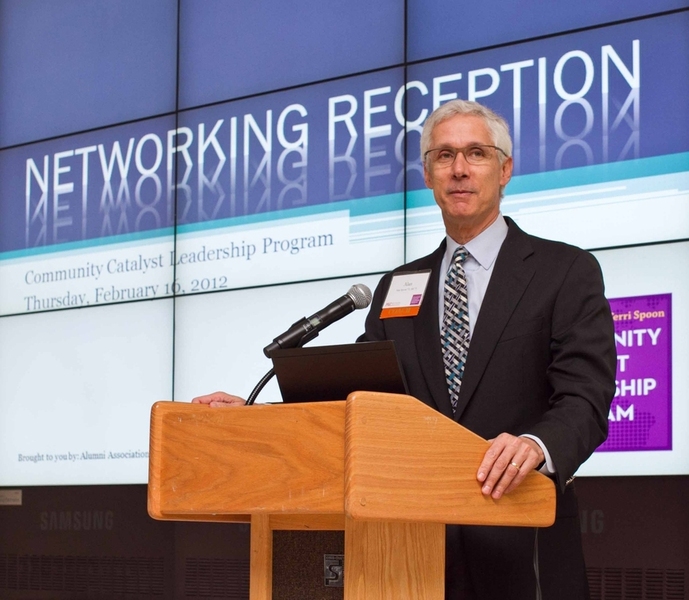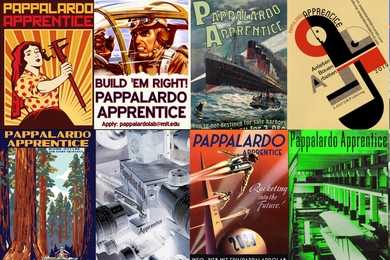This year marks the fifth anniversary of the Community Catalyst Leadership Program (CCLP). Since 2007, CCLP has asked MIT juniors to engage in a journey of personal leadership development and reflection. Each participant is matched with an MIT alumnus or staff member in a coaching relationship to develop leadership skills tailored to their personal and development goals.
The program, which celebrates its end-of-year dinner with MIT President Hockfield this week, is the vision of Alan ’73 and Terri Spoon, coordinated in partnership with the MIT Alumni Association, the Student Activities Office, and the Division of Student Life. The Spoons funded the program’s first five years, and last year committed to funding CCLP for the next five, as well.
Alan Spoon has over 30 years of professional leadership experience, most recently as general partner at Polaris Venture Partners. Prior to his work at Polaris, he served in various senior management roles at the Washington Post Company, including as president and board member. The Division of Student Life recently spoke with Spoon about the importance of leadership skills for MIT students, the value of coaching relationships, and the future of CCLP.
Q. MIT prepares students to become exceptional scientists, engineers, scholars and innovators. Why is it important to help students develop as leaders?
A. MIT students obviously come with great gifts of all kinds: analytical gifts, gifts of energy and gifts of accomplishment. I’m assuming virtually all of them have leadership experiences with varying degrees of prominence and success. We have a student population of great capability and I think it’s beholden on us to give them the full opportunity to grow as leaders.
I think there’s an expectation that MIT graduates ought to be able to very effectively carry out leadership responsibilities. It will fall naturally to MIT graduates to take those gifts and combine them with leadership to accomplish great things and solve great challenges, here and everywhere around the world.
Leadership is a combination of some natural gifts and a lot of disciplined and experiential practice. There’s just no substitute for thinking in an orderly way about leadership tasks, leadership styles, and one’s own style, and having a chance to practice that with feedback. That’s what CCLP is able to do. Importantly, this opportunity comes at an earlier age than was the case when I was coming through. The natural leadership opportunity and mandate was given to me in my later 20s. I wish I had thought about things in my later 20s that the CCLP students are beginning to ponder now and to reflect on now. They’re fully capable of it, so why wait?
Q. Your program’s approach is to pair a student with a coach. How does that relationship work in practice and how did you come to settle on that as the structure?
A. The mentor relationship is a great mechanism that proves itself again and again in one’s own career path. I had a number of mentors along the way who helped grow my own leadership experience and opportunity. What’s special about these mentor relationships is that there is no relationship of dependency that clouds the agenda. There’s a mutual independence between our coaches and the students. The students can be totally candid, frank, and open to take risks. That isn’t always the case with some of your mentors in your work. Risks are difficult to take given the oversight that mentors might have over you.
The other thing that drives us to this mentoring program is that it’s one thing to have a lot of thoughts in your head between your ears, and it’s another thing to hear yourself talk. The coaches go beyond just being listening posts, and that’s an enormously valuable relationship. The students spend an hour or more per month with the coaches, and it’s not talking about last night’s sports game. The students come, with each passing month, more prepared to talk about how to make the most of their immediate leadership challenges and learnings. The coaches have their own leadership experiences and can play back both what they’re hearing and what their own experience was. The students can draw those experiences out with their questions. The coaches have a broad value as listeners, as questioners, and as advisers where there’s relevant leadership experience to be shared.
It’s a model that we’re very fortunate to have, recognizing that it’s very people-intensive. We have 35 coaches, and the vast majority of them are returning, so they really love what they’re doing. The one-on-one nature of it is a windfall. The coaches really enjoy working with the students. I know I’ve certainly enjoyed working with the students for the last five years. They’re amazing. If you can make time for it, you should. It’s a joy to work with them and grow them.
Q. After the first five years, what lessons have you learned for CCLP, and where you would like to take it in the next five years?
A. I’ve learned a number of lessons: one, a continued reinforcement of how sparkling and amazing the students are. You come away from the CCLP functions lifted by the promise that the students have and bring. I didn’t know how the coaches and the one-on-one structure would work. It’s worked better than we ever expected, both for the students and for the coaches.
I’ve also learned that there are networking opportunities here that are really important to the students as they move into their careers. A lot of CCLP alumni are out in the workforce, and they have a relationship as a “graduate” group that we’re trying to foster. When former CCLP students get together now that they are in the early year of their careers, it’s just fascinating how they have a common bond in being interested in leadership in a fundamental way. They’re comparing notes. They can relate to each other in ways that are useful for years and years to come in geographies outside Cambridge.
I’m excited that CCLP networking is nicely aligned with the alumni association. We can do these kinds of extended programs not just on campus but for the graduates of the program here, there, and everywhere. The content continues to evolve forward. It’s not so time intensive that you’ve got 30 lectures. It’s the practical takeaway about how to learn about leadership, about how to be in contact with folks, about how to be highly self-aware, and about how to be effective as a leader. I think the program’s doing a nice job at that, and we’ll continue to evolve the content. I don’t mean to say to change course, but drive it and enrich it without being overtaxing.
Part of the learning that’s going on right now is looking at the sophomore and senior years. [CCLP is currently built around the junior year.] The concern was that during junior year, people are making plans for graduate school or jobs. Or, they’ve already been saddled with leadership responsibilities, and they don’t have time to breathe. Doing well in their classes is important, too! We thought maybe there’s a way to catch them a little earlier so that they have a little more breathing time and capacity to absorb this so that they can later apply it in their junior year. In the case of seniors, it’s not just the opportunity, but the continuing workshop for our graduates to come back and truly show some of their leadership skills and help bring others forward. Leadership is about grooming others, and what better way to do that than to have graduates come back and help those going through the program to make the best use of it.
For more information, visit the Community Catalyst Leadership Program’s website.
The program, which celebrates its end-of-year dinner with MIT President Hockfield this week, is the vision of Alan ’73 and Terri Spoon, coordinated in partnership with the MIT Alumni Association, the Student Activities Office, and the Division of Student Life. The Spoons funded the program’s first five years, and last year committed to funding CCLP for the next five, as well.
Alan Spoon has over 30 years of professional leadership experience, most recently as general partner at Polaris Venture Partners. Prior to his work at Polaris, he served in various senior management roles at the Washington Post Company, including as president and board member. The Division of Student Life recently spoke with Spoon about the importance of leadership skills for MIT students, the value of coaching relationships, and the future of CCLP.
Q. MIT prepares students to become exceptional scientists, engineers, scholars and innovators. Why is it important to help students develop as leaders?
A. MIT students obviously come with great gifts of all kinds: analytical gifts, gifts of energy and gifts of accomplishment. I’m assuming virtually all of them have leadership experiences with varying degrees of prominence and success. We have a student population of great capability and I think it’s beholden on us to give them the full opportunity to grow as leaders.
I think there’s an expectation that MIT graduates ought to be able to very effectively carry out leadership responsibilities. It will fall naturally to MIT graduates to take those gifts and combine them with leadership to accomplish great things and solve great challenges, here and everywhere around the world.
Leadership is a combination of some natural gifts and a lot of disciplined and experiential practice. There’s just no substitute for thinking in an orderly way about leadership tasks, leadership styles, and one’s own style, and having a chance to practice that with feedback. That’s what CCLP is able to do. Importantly, this opportunity comes at an earlier age than was the case when I was coming through. The natural leadership opportunity and mandate was given to me in my later 20s. I wish I had thought about things in my later 20s that the CCLP students are beginning to ponder now and to reflect on now. They’re fully capable of it, so why wait?
Q. Your program’s approach is to pair a student with a coach. How does that relationship work in practice and how did you come to settle on that as the structure?
A. The mentor relationship is a great mechanism that proves itself again and again in one’s own career path. I had a number of mentors along the way who helped grow my own leadership experience and opportunity. What’s special about these mentor relationships is that there is no relationship of dependency that clouds the agenda. There’s a mutual independence between our coaches and the students. The students can be totally candid, frank, and open to take risks. That isn’t always the case with some of your mentors in your work. Risks are difficult to take given the oversight that mentors might have over you.
The other thing that drives us to this mentoring program is that it’s one thing to have a lot of thoughts in your head between your ears, and it’s another thing to hear yourself talk. The coaches go beyond just being listening posts, and that’s an enormously valuable relationship. The students spend an hour or more per month with the coaches, and it’s not talking about last night’s sports game. The students come, with each passing month, more prepared to talk about how to make the most of their immediate leadership challenges and learnings. The coaches have their own leadership experiences and can play back both what they’re hearing and what their own experience was. The students can draw those experiences out with their questions. The coaches have a broad value as listeners, as questioners, and as advisers where there’s relevant leadership experience to be shared.
It’s a model that we’re very fortunate to have, recognizing that it’s very people-intensive. We have 35 coaches, and the vast majority of them are returning, so they really love what they’re doing. The one-on-one nature of it is a windfall. The coaches really enjoy working with the students. I know I’ve certainly enjoyed working with the students for the last five years. They’re amazing. If you can make time for it, you should. It’s a joy to work with them and grow them.
Q. After the first five years, what lessons have you learned for CCLP, and where you would like to take it in the next five years?
A. I’ve learned a number of lessons: one, a continued reinforcement of how sparkling and amazing the students are. You come away from the CCLP functions lifted by the promise that the students have and bring. I didn’t know how the coaches and the one-on-one structure would work. It’s worked better than we ever expected, both for the students and for the coaches.
I’ve also learned that there are networking opportunities here that are really important to the students as they move into their careers. A lot of CCLP alumni are out in the workforce, and they have a relationship as a “graduate” group that we’re trying to foster. When former CCLP students get together now that they are in the early year of their careers, it’s just fascinating how they have a common bond in being interested in leadership in a fundamental way. They’re comparing notes. They can relate to each other in ways that are useful for years and years to come in geographies outside Cambridge.
I’m excited that CCLP networking is nicely aligned with the alumni association. We can do these kinds of extended programs not just on campus but for the graduates of the program here, there, and everywhere. The content continues to evolve forward. It’s not so time intensive that you’ve got 30 lectures. It’s the practical takeaway about how to learn about leadership, about how to be in contact with folks, about how to be highly self-aware, and about how to be effective as a leader. I think the program’s doing a nice job at that, and we’ll continue to evolve the content. I don’t mean to say to change course, but drive it and enrich it without being overtaxing.
Part of the learning that’s going on right now is looking at the sophomore and senior years. [CCLP is currently built around the junior year.] The concern was that during junior year, people are making plans for graduate school or jobs. Or, they’ve already been saddled with leadership responsibilities, and they don’t have time to breathe. Doing well in their classes is important, too! We thought maybe there’s a way to catch them a little earlier so that they have a little more breathing time and capacity to absorb this so that they can later apply it in their junior year. In the case of seniors, it’s not just the opportunity, but the continuing workshop for our graduates to come back and truly show some of their leadership skills and help bring others forward. Leadership is about grooming others, and what better way to do that than to have graduates come back and help those going through the program to make the best use of it.
For more information, visit the Community Catalyst Leadership Program’s website.






